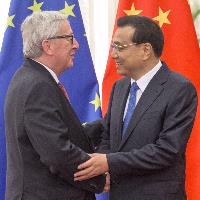(BEIJING) – The European Union and China concluded a “fruitful and conclusive” two-day summit in Beijing Wednesday, with candid discussion over Europe’s troubled steel industry and human rights.
Council president Donald Tusk and Commission president Jean-Claude Juncker represented the EU at the 18th bilateral EU-China summit, with China represented by Prime Minister Li Keqiang.
The leaders provided political guidance for completion of a comprehensive agreement on investment, and signed an energy roadmap. They also agreed to have another round of the human rights dialogue between the trading blocs later this year in Brussels.
Mr Juncker made clear the problems caused by the overcapacity in China’s steel industry. He cited Europe’s own overcapacity in steel in the 1970s and 1980s, and the huge job losses and pain endured by his own country, Luxembourg, and Europe as a whole, and said he understood the difficulties this causes China.
The summit agreed to establish an EU-China common working group on steel to discuss steel overproduction and “verification and monitoring mechanisms”, and to look in depth into ways of tackling the issue.
The European side did not shy away from establishing a link between steel overcapacity of China and the market economy status that China seeks.
A clear theme for the Europeans was the importance of “international cooperation based on rules”. A global order based on common rules is in our mutual interest, said Mr Tusk, “but clearly we have our differences in what it means in practise.”
At the summit, leaders discussed other common challenges, such as the protection of the rule-based international order.
Ahead of the September G20 summit in China, the leaders agreed to tackle the migration crisis at a global level. With over 60 million displaced people around the world seeking protection, the international community needed to step up its efforts, said Mr Tusk.
The EU said it looked forward to working closely with China to address foreign policy priorities, including Syria, Iraq, Afghanistan or Africa. And the same went for global issues such as development assistance or climate change.


